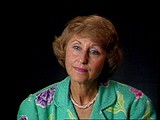You searched for: ust交易程序後臺源碼【tg���������@ek7676】平台包网搭建unit交易程序後臺源碼【tg���������@ek7676】平台包网搭建ivkcss1pgu
<< Previous | Displaying results 1641-1650 of 1751 for "ust交易程序後臺源碼【tg���������@ek7676】平台包网搭建unit交易程序後臺源碼【tg���������@ek7676】平台包网搭建ivkcss1pgu" | Next >>
-
Leo Melamed describes saying goodbye to father as he fled Bialystok
Oral HistoryLeo was seven years old when Germany invaded Poland in September 1939. Before the war, Leo's father was a mathematics teacher and member of the Bialystok City Council. Fearing arrest, Leo's father fled Bialystok for Vilna just before the German occupation. Leo and his mother eventually joined his father in Vilna. After the Soviets occupied Vilna, Leo's father obtained transit visas to Japan. The family left Vilna in December 1940, traveled across the Soviet Union on the Trans-Siberian Express, and arrived…
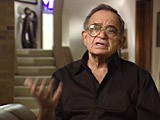
-
Felix Horn describes antisemitism in Lvov and conditions in the Janowska camp
Oral HistoryFelix was born to an assimilated Jewish family in Lublin, Poland. His father was a locksmith and his mother was a singer. Following the German invasion of Poland on September 1, 1939, Felix fled east to Rovno and then to Soviet-occupied Lvov, where he was accepted at a medical school. After the German invasion of the Soviet Union in June 1941, Felix was taken to a labor camp. He escaped and returned to Lublin, and found that his family had been forced into the ghetto established there. After the…
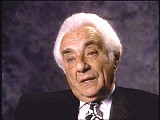
-
Agnes Mandl Adachi describes rescue activity on the banks of the Danube River and the role of Raoul Wallenberg
Oral HistoryAgnes was in Switzerland in 1939 to study French. She returned to Budapest in 1940. After the Germans occupied Hungary in 1944, Agnes was given refuge in the Swedish embassy. She then began to work for Swedish diplomat Raoul Wallenberg in his efforts to save the Jews of Budapest, including the distribution of protective passes (Schutzpaesse). When the Soviets entered Budapest, Agnes decided to go to Romania. After the war, she went to Sweden and Australia before moving to the United States.
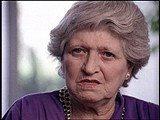
-
Agnes Mandl Adachi describes Raoul Wallenberg's efforts to save Jews from deportation
Oral HistoryAgnes was in Switzerland in 1939 to study French. She returned to Budapest in 1940. After the Germans occupied Hungary in 1944, Agnes was given refuge in the Swedish embassy. She then began to work for Swedish diplomat Raoul Wallenberg in his efforts to save the Jews of Budapest, including the distribution of protective passes (Schutzpaesse). When the Soviets entered Budapest, Agnes decided to go to Romania. After the war, she went to Sweden and Australia before moving to the United States.
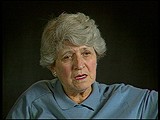
-
Benjamin (Beryl) Ferencz describes evidence collected at the Mauthausen camp
Oral HistoryBen was born in a small village in the Carpathian Mountains of Transylvania in Romania. When he was an infant, his family moved to the United States. Ben attended Harvard University, where he studied criminal law. Ben graduated from Harvard University Law School in 1943. He joined a US anti-aircraft artillery battalion that was training in preparation for an Allied invasion of western Europe. At the end of World War II in Europe, Ben was transferred to the war crimes investigation branch of the US Army. He…
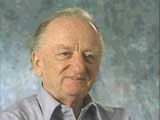
-
Henny Fletcher Aronsen describes the importance she attached to the role of cleanliness in surviving forced labor at Stutthof
Oral HistoryHenny was born into an upper-middle-class Jewish family in Kovno, Lithuania. She and her brother attended private schools. In June 1940 the Soviets occupied Lithuania, but little seemed to change until the German invasion in June 1941. The Germans sealed off a ghetto in Kovno in August 1941. Henny and her family were forced to move into the ghetto. Henny married in the ghetto in November 1943; her dowry was a pound of sugar. She survived several roundups during which some of her friends and family were…
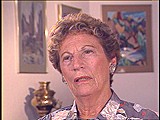
-
Walter Meyer describes activities of members of the Edelweiss Pirates in Duesseldorf, Germany
Oral HistoryWalter was born in Kassel, north central Germany, but grew up in the Rhineland. As a youth, Walter questioned the German superiority and antisemitism he was taught. His father, an anti-Nazi, refused to allow Walter to enter one of the Adolf Hitler Schools, but did permit him to join the Hitler Youth. However, Walter's rebellious streak led him to hide a Jewish friend in his basement. He also formed a gang that played pranks on young Nazis and helped French prisoners of war. They called themselves Edelweiss…
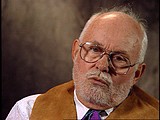
-
Walter Meyer describes his 1943 trial for looting, and the impact of his role in the Edelweiss Pirates on the sentence he received
Oral HistoryWalter was born in Kassel, north central Germany, but grew up in the Rhineland. As a youth, Walter questioned the German superiority and antisemitism he was taught. His father, an anti-Nazi, refused to allow Walter to enter one of the Adolf Hitler Schools, but did permit him to join the Hitler Youth. However, Walter's rebellious streak led him to hide a Jewish friend in his basement. He also formed a gang that played pranks on young Nazis and helped French prisoners of war. They called themselves Edelweiss…
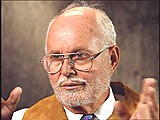
-
Sandor (Shony) Alex Braun describes playing the violin for SS guards in Dachau. after two prisoners before him had been killed
Oral HistoryShony was born to religious Jewish parents in a small Transylvanian city. He began to learn the violin at age 5. His town was occupied by Hungary in 1940 and by Germany in 1944. In May 1944, he was deported to the Auschwitz camp in Poland. He was transferred to the Natzweiler camp system in France and then to Dachau, where he was liberated by US troops in April 1945. In 1950, he immigrated to the United States, and became a composer and a professional violinist.
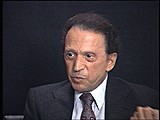
-
Doriane Kurz describes food rations and conditions in Bergen-Belsen
Oral HistoryDoriane's Jewish family fled to Amsterdam in 1940, a year that also saw the German occupation of the Netherlands. Her father perished after deportation to Auschwitz. After their mother was seized, Doriane and her brother hid with gentiles. The three were reunited at Bergen-Belsen, where they were deported via Westerbork. They were liberated during the camp's 1945 evacuation. Doriane's mother died of cancer soon after Doriane helped her recover from typhus. Doriane and her brother immigrated to the United…
